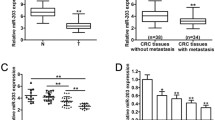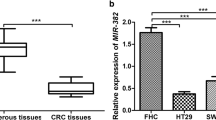Abstract
MicroRNAs play critical roles in the development and progression of colorectal cancer (CRC). miR-154 acts as a tumor suppressor in several tumors; however, its role in CRC is poorly understood. Herein, we found that miR-154 was decreased in CRC tissues and cell lines. Ectopic expression of miR-154 remarkably suppressed cell proliferation and colony formation, migration and invasion in CRC cells. The toll-like receptor 2 (TLR2) was found to be a direct target of miR-154 in CRC cells. Inhibition of TLR2 performed similar effects with miR-154 overexpression on CRC cells, and overexpression of TLR2 could significantly reverse the tumor suppressive effects of miR-154 on CRC cells. This study suggests an essential role for miR-154 in CRC.






Similar content being viewed by others
References
Siegel R, Naishadham D, Jemal A (2012) Cancer statistics, 2012. CA Cancer J Clin 62:10–29
Oliphant R, Nicholson GA, Horgan PG, Molloy RG, McMillan DC, Morrison DS, West of Scotland Colorectal Cancer Managed Clinical Network (2013) Contribution of surgical specialization to improved colorectal cancer survival. Br J Surg 100:1388–1395
Ceelen WP (2013) Current management of peritoneal carcinomatosis from colorectal cancer. Minerva Chir 68:77–86
Dassow H, Aigner A (2013) MicroRNAs (miRNAs) in colorectal cancer: from aberrant expression towards therapy. Curr Pharm Des 19:1242–1252
Lee Y, Ahn C, Han J, Choi H, Kim J, Yim J, Lee J, Provost P, Radmark O, Kim S, Kim VN (2003) The nuclear RNase III Drosha initiates microRNA processing. Nature 425:415–419
Roth BM, Ishimaru D, Hennig M (2013) The core microprocessor component DiGeorge syndrome critical region 8 (DGCR8) is a non-specific RNA-binding protein. J Biol Chem 288(37):26785–26799
Solomides CC, Evans BJ, Navenot JM, Vadigepalli R, Peiper SC, Wang ZX (2012) MicroRNA profiling in lung cancer reveals new molecular markers for diagnosis. Acta Cytol 56:645–654
Yamada N, Nakagawa Y, Tsujimura N, Kumazaki M, Noguchi S, Mori T, Hirata I, Maruo K, Akao Y (2013) Role of intracellular and extracellular microRNA-92a in colorectal cancer. Transl Oncol 6:482–492
Hu G, Chen D, Li X, Yang K, Wang H, Wu W (2010) miR-133b regulates the MET proto-oncogene and inhibits the growth of colorectal cancer cells in vitro and in vivo. Cancer Biol Ther 10:190–197
Karaayvaz M, Zhai H, Ju J (2013) miR-129 promotes apoptosis and enhances chemosensitivity to 5-fluorouracil in colorectal cancer. Cell Death Dis 4:e659
Liu K, Zhao H, Yao H, Lei S, Lei Z, Li T, Qi H (2013) MicroRNA-124 regulates the proliferation of colorectal cancer cells by targeting iASPP. Biomed Res Int 2013:867537
Qian X, Yu J, Yin Y, He J, Wang L, Li Q, Zhang LQ, Li CY, Shi ZM, Xu Q, Li W, Lai LH, Liu LZ, Jiang BH (2013) MicroRNA-143 inhibits tumor growth and angiogenesis and sensitizes chemosensitivity to oxaliplatin in colorectal cancers. Cell Cycle 12:1385–1394
Zhang GJ, Xiao HX, Tian HP, Liu ZL, Xia SS, Zhou T (2013) Upregulation of microRNA-155 promotes the migration and invasion of colorectal cancer cells through the regulation of claudin-1 expression. Int J Mol Med 31:1375–1380
Wu W, Yang J, Feng X, Wang H, Ye S, Yang P, Tan W, Wei G, Zhou Y (2013) MicroRNA-32 (miR-32) regulates phosphatase and tensin homologue (PTEN) expression and promotes growth, migration, and invasion in colorectal carcinoma cells. Mol Cancer 12:30
Sun D, Yu F, Ma Y, Zhao R, Chen X, Zhu J, Zhang CY, Chen J, Zhang J (2013) MicroRNA-31 activates the RAS pathway and functions as an oncogenic microRNA in human colorectal cancer by repressing RAS p21 GTPase activating protein 1 (RASA1). J Biol Chem 288:9508–9518
Bandrés E, Cubedo E, Agirre X, Malumbres R, Zarate R, Ramirez N, Abajo A, Navarro A, Moreno I, Monzo M and Garcia-Foncillas J (2006) Identification by Real-time PCR of 13 mature microRNAs differentially expressed in colorectal cancer and non-tumoral tissues. Mol Cancer 5:29. doi:10.1186/1476-4598-5-29
Zhu C, Li J, Cheng G, Zhou H, Tao L, Cai H, Li P, Cao Q, Ju X, Meng X, Wang M, Zhang Z, Qin C, Hua L, Yin C, Shao P (2013) miR-154 inhibits EMT by targeting HMGA2 in prostate cancer cells. Mol Cell Biochem 379:69–75
Zhu C, Shao P, Bao M, Li P, Zhou H, Cai H, Cao Q, Tao L, Meng X, Ju X, Qin C, Li J, Yin C (2013) miR-154 inhibits prostate cancer cell proliferation by targeting CCND2. Urol Oncol. doi:10.1016/j.urolonc.2012.11.013
Wang W, Peng B, Wang D, Ma X, Jiang D, Zhao J, Yu L (2011) Human tumor microRNA signatures derived from large-scale oligonucleotide microarray datasets. Int J Cancer 129:1624–1634
Reynolds JM, Dong C (2013) Toll-like receptor regulation of effector T lymphocyte function. Trends Immunol 34(10):511–519
Piccinini AM, Midwood KS (2010) DAMPening inflammation by modulating TLR signalling. Mediators Inflamm 2010. doi:10.1155/2010/672395
Willcocks S, Offord V, Seyfert HM, Coffey TJ, Werling D (2013) Species-specific PAMP recognition by TLR2 and evidence for species-restricted interaction with Dectin-1. J Leukoc Biol 94(3):449–458
Guo H, Chen Y, Hu X, Qian G, Ge S, Zhang J (2013) The regulation of toll-like receptor 2 by miR-143 suppresses the invasion and migration of a subset of human colorectal carcinoma cells. Mol Cancer 12:77
Zeljic K, Supic G, Jovic N, Kozomara R, Brankovic-Magic M, Obrenovic M, Magic Z (2013) Association of TLR2, TLR3, TLR4 and CD14 genes polymorphisms with oral cancer risk and survival. Oral Dis. doi:10.1111/odi.12144
Kennedy CL, Najdovska M, Tye H, McLeod L, Yu L, Jarnicki A, Bhathal PS, Putoczki T, Ernst M, Jenkins BJ (2013) Differential role of MyD88 and Mal/TIRAP in TLR2-mediated gastric tumourigenesis. Oncogene. doi:10.1038/onc.2013.205
Yang HZ, Cui B, Liu HZ, Mi S, Yan J, Yan HM, Hua F, Lin H, Cai WF, Xie WJ, Lv XX, Wang XX, Xin BM, Zhan QM, Hu ZW (2009) Blocking TLR2 activity attenuates pulmonary metastases of tumor. PLoS One 4:e6520
Huang B, Zhao J, Unkeless JC, Feng ZH, Xiong H (2008) TLR signaling by tumor and immune cells: a double-edged sword. Oncogene 27:218–224
Kim S, Takahashi H, Lin WW, Descargues P, Grivennikov S, Kim Y, Luo JL, Karin M (2009) Carcinoma-produced factors activate myeloid cells through TLR2 to stimulate metastasis. Nature 457:102–106
Conflict of interest
The authors declare that they have no conflict of interest.
Author information
Authors and Affiliations
Corresponding author
Additional information
Chaoguang Xin and Hao Zhang have contributed equally to this work.
Rights and permissions
About this article
Cite this article
Xin, C., Zhang, H. & Liu, Z. miR-154 suppresses colorectal cancer cell growth and motility by targeting TLR2. Mol Cell Biochem 387, 271–277 (2014). https://doi.org/10.1007/s11010-013-1892-3
Received:
Accepted:
Published:
Issue Date:
DOI: https://doi.org/10.1007/s11010-013-1892-3




